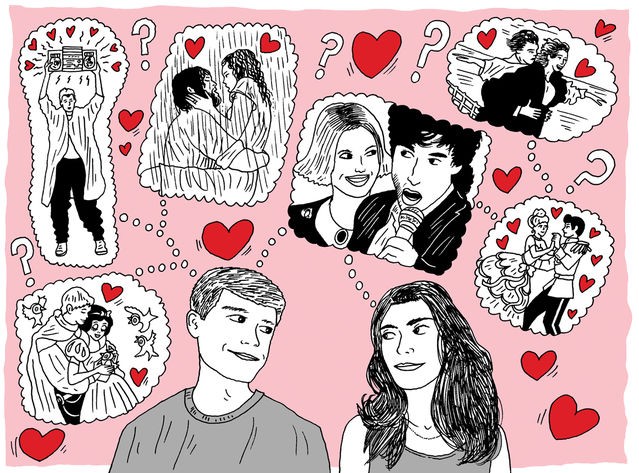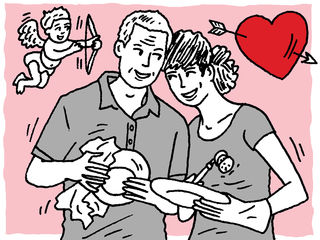What Love Really Looks Like
How our lofty ideas about love relate to the real thing.
By Matt Huston and Bethany Radcliff published January 3, 2017 - last reviewed on March 9, 2017

A man spots a woman across a crowded room and knows that they're meant to be together. He wins her heart, but then he makes a big mistake—or fate pulls them apart—and he is sure he's lost her forever. Talking with his closest friends, he realizes that she's still the only one for him. So he tracks her down and publicly declares his love (in song, perhaps), and they end up in each other's arms with a story to tell their kids. Sound familiar? Anyone who has seen a movie starring Hugh Grant or read a romance novel on the beach knows some version of this story. But how would the conventional plot points of romantic fiction play out in the real world? We asked a few experts for a reality check. —Matt Huston
I Knew From the Start
What romantic doesn't hope to one day be stung by the feeling that he or she has finally laid eyes on "the one"—like when Jack first glimpses Rose on the deck of the Titanic? Holding out for love at first sight, however, may be ill-advised as a dating strategy, especially if "the zing never comes and you're passing by other great options," says psychologist Maryanne Fisher of Saint Mary's University. In reality, love can take root with or without that kind of lightbulb moment, she explains, and communicating openly (as opposed to falling for someone without saying a word) is key to love's flourishing. Conversely, anyone who is thunderstruck by a beautiful stranger but already committed to someone else should take a sober view of the situation—rather than leaping into action, as movie characters in less-than-enchanted relationships often do after discovering "the one." Romance plots "seem to perpetuate the notion that if you are attracted to someone else, you must be with the wrong person," says Galena Rhoades, a psychologist at the University of Denver. "But feeling attracted to other people is natural, and it doesn't always mean that there's something wrong in the relationship."
She Will Be Mine
Once a protagonist has "the one" in his sights, he often locks in and goes to great lengths to prove his devotion. That could mean planting a field of her favorite flowers, renovating a house for her (per The Notebook), or just refusing to go away. Sound a bit like stalking? Films that romanticize this kind of behavior send a dubious message, according to Julia Lippman, a communication researcher at the University of Michigan. (Others seem to agree: See the YouTube video that recuts The Notebook as a stalker thriller.) "It can be a nice, escapist fantasy, placing your ideal man in the role of someone who wants you so badly he will stop at nothing to have you," Lippman says. But replace that fictitious fellow with a real guy in whom you are not interested? "Not so great."
From the Rooftops
In movies like Say Anything and The Wedding Singer, a romantic crisis leads to an 11th-hour dash to save the relationship—one that often requires loud music and reckless driving. But what if your own romance lacks such thrills? "People may get the sense that a relationship must not be meaningful if it's not happening with the urgency that we often see in the movies," Rhoades says. "That message may do them a disservice." Grand gestures are fine, as long as they don't mortify their audience. But chasing someone to an airport gate to win him or her back may be a mistake. "If you've ended a relationship and are starting fresh," Fisher says, "I don't think you'd really want your ex to turn up and say, 'I love you and let's try to make it work.'"

What Next?
The romance genre tends to fixate on the early stages of relationships, ending neatly with a white wedding or a fortuitous kiss. "Commitment is depicted as a single decision," Rhoades says. In real life, that's rarely the case. "It winds up being many decisions, as things change, about whether you want to stay together and what that means for you." Reaffirming a bond need not involve silver screen-worthy acts: It can be done by sharing quiet moments and just being there when a partner needs you. "Think of what a good relationship entails each day: You go to work, come home, spend the evening together watching TV, doing dishes, maybe having a glass of wine," says Sean Horan, a communication researcher at Texas State University. Some experts, he adds, argue that "doing the dishes together every night, if that's your ritual, could be a beautiful way to maintain your relationship."
Dream On
Rosy ideas about true love may be unrealistic, but do they influence how satisfied partners are in actual relationships? Psychologists Sarah Vannier and Lucia O'Sullivan sought to find out, measuring how strongly 18- to 28-year-olds in committed relationships endorse beliefs about enduring love, love at first sight, and ideal partners (for example: "I am likely to fall in love almost immediately if I find the right person"). Contrary to concerns voiced by some researchers, endorsing these beliefs was not associated with deeper disappointment in the relationships—on average, believers tended to be more satisfied and committed. According to psychologist Bianca Acevedo of the University of California, Santa Barbara, the findings suggest that "setting high hopes and having a vision for the kind of relationship that you want is not futile. It could actually promote positive relationships." —Bethany Radcliff
Facebook image: Khoroshunova Olga/Shutterstock
